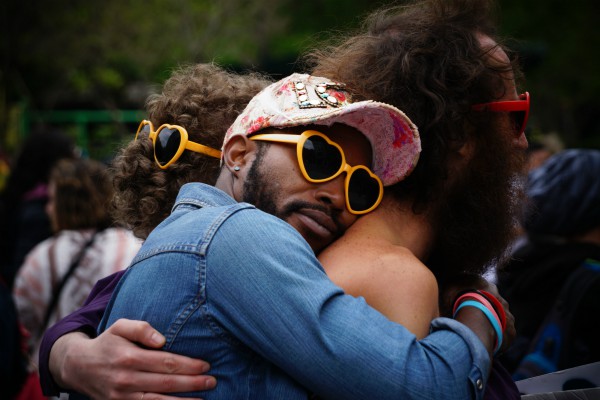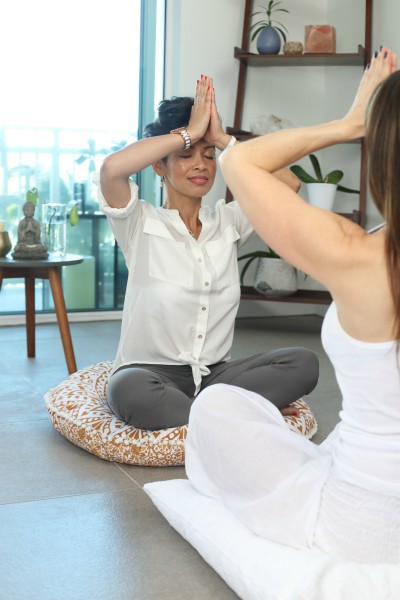According to the science of happiness (yes—that really is a thing) social connections aren’t just useful for making brunch plans. They’re key factors in determining happiness, overall quality of life, and even how long we’ll live.
Thanks, science of happiness, for proving the obvious—that relationships—with our friends, family, book club, gym buddy, you name it—increase our joy. But even if it screams duh to most of us, the research behind relationship-based bliss is massive and might just be the push we need to prioritize our people over pretty much everything else.
Let’s dig into why quality relationships keep us smiling, according to the science of happiness, and how we can make them pleasure-priority number one.
Why Contentment = Connection

The science of happiness gets a big boost from findings from the famous Harvard Study of Adult Development. Researchers have been tracking the health and happiness of a group of Harvard alumni and their family for over 80 years and found that the quality of our relationships is tied to the quality of our lives. Close relationships make us happy and even help stave off physical and mental decline.
In fact, the quality of participants’ relationships was a better predictor of long and healthy lives than genes or socioeconomic status. The science of happiness proves it: Our relationships matter in big, real ways.
What’s more is those social connection benefits are quantifiable. In a meta-analysis of 148 studies published in the journal PLOS Medicine, researchers found that people with stronger social relationships actually lived longer. How much longer? People with quality connections were 50 percent more likely to stay alive than people without a strong social sphere. And this applied regardless of age, sex, and health status. Want to increase your odds of sticking around by 50 percent? Build your social bonds—and keep ‘em strong.
See, your squad really does have serious power.
How to Revamp Your Relationships, According to the Science of Happiness

The science of happiness also has a lot to say about how to make your social relationships even stronger. Luckily, it’s based on doing more of the things that make your friendships so great in the first place. Here are three ways to up your happy by making your social circle even stronger.
1. Be interested—not just interesting

Ralph Waldo Emerson said, “The only way to have a friend is to be one.” Cliché? Yes. But it’s also a scientifically-proven strategy. Asking follow-up questions when a friend is talking—i.e. not just chiming in with your own stories—makes people more likely to want to engage with you again, found a study in the Journal of Experimental Social Psychology.
To pay more attention to your people, keep your phone out of sight, focus on the details, and ask specific questions to get them to elaborate. And hey, the more you model this, the more likely your friends are to start doing the same. So we get better friendships and better listeners in the process. Win-win.
2. Use your common bonds to strengthen your actual ones

No one agrees on everything, we know. But spending more time talking about the things you do have in common—your mutual distaste for overly peppy spin instructors, for instance—might deepen your bond more than debating your differences—say the merits of red vs. white wine. (Truth: All wine is good wine. You’re welcome.)
Research shows a connection between similar attitudes and strength of friendship, according to a study in the International Journal of Innovation, Management, and Technology. This finding was true regardless of gender. So focus on your common interests to fuel your friendships. You know how to do this already.
3. Get lunch—for real this time

Keeping your friendships as up to date as your iPhone can make you happier than showing off that shiny new tech. Not so good at this? There’s still hope. Even if your collective flakiness means you haven’t chatted for ages, don’t write your friendship off as a lost cause. Relationships that go dormant are still valuable sources of knowledge and social capital, according to a study published in Organization Science. So yes, you really should get lunch with your college roommate or make Skype dates a priority to plus up your delight.
The bottom line? The science of happiness says investing in the quality of our relationships will deliver a kid-in-a-candy-store level happiness boost. Consider this your excuse to silence work emails and spend more time with your friends this weekend.
How do you keep the connection strong with your crew? Share in the comments and keep coming back for more strategies on the science of happiness.
Author: Macaela Mackenzie
Macaela Mackenzie is a freelance writer and content strategist. When she doesn’t have her nose in a research journal or the New York Times, she’s likely to be found looking for punny greeting cards or an excuse to explore a new travel spot.

Let Us Know What You Think